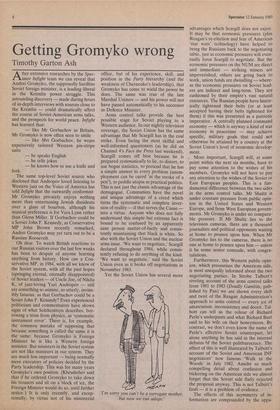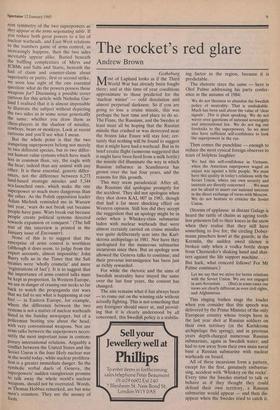Getting Gromyko wrong
Timothy Garton Ash
After extensive researches by the Spec- tator Infight team we can reveal that Andrei Gromyko, the supposedly hardline Soviet foreign minister, is a leading liberal in the Kremlin power struggle. This astounding discovery — made during hours of in-depth interviews with sources close to the Kremlin — could dramatically affect the course of Soviet-American arms talks, and the prospects for world peace. Infight has learned that:
— like Mr Gorbachov in Britain, Mr Gromyko is now often seen to smile — like Mrs Gorbachov, he wears expensively tailored Western pin-stripe suits ,— he speaks English — he tells jokes — he knows how to use a knife and fork.
The same top-level Soviet source who disclosed that Andropov loved listening to Western jazz on the Voice of America has told lnfight that the outwardly conformist Mr Gromyko privately enjoys nothing more than entertaining Jewish dissidents over a glass of bourbon, although his musical preference is for Vera Lynn rather than Glenn Miller. If Gorbachov could be a Soviet John F. Kennedy, as Conservative MP John Brown recently remarked, Andrei Gromyko may yet turn out to be a Russian Roosevelt.
Oh dear. To watch British reactions to our Russian visitors over the last few weeks has been to despair of anyone learning anything from history. How can a Con- servative MP, in 1984, with all we know of the Soviet system, with all the past hopes (springing eternal, eternally disappointed) of Soviet leaders — of Uncle Joe, of Nikita K, of jazz-loving Yuri Andropov — still say something so asinine, so utterly, invinc- ibly fatuous, as that Gorbachov could be a Soviet John F. Kennedy? Even experienced politicians and commentators have shown signs of what Solzhenitsyn describes, bor- rowing a term from physics, as 'systematic instrument error'. There is, for example, the common mistake of supposing that because something is called the same it is the same: because Gromyko is Foreign Minister he is like a Western foreign minister. But ministers in the Soviet system are not like ministers in our system. They are much less important — being normally mere executors of policies decided by the Party leadership. This was for many years Gromyko's own position. (Khrushchev said that if he ordered Gromyko to take down his trousers and sit on a block of ice, the Foreign Minister would do so, until further notice.) It is only recently, and excep- tionally, by virtue not of his ministerial office, but of his experience, skill, and position in the Party hierarchy (and the weakness of Chernenko's leadership), that Gromyko has come to wield the power he does. The same was true of the late Marshal Ustinov — and his power will not have passed automatically to his successor as Defence Minister.
Arms control talks provide the best possible stage for Soviet playing to a Western audience. In our nightly television coverage, the Soviet Union has the same advantage that Mr Scargill has in the coal strike. Even facing the most skilful and well-informed questioners (as he did on Channel 4's Face the Press last weekend), Scargill comes off best because he is prepared systematically to lie, to distort, to use bogus statistics, to pretend that he has a simple answer to every problem (unem- ployment can be cured 'at the stroke of a pen'), to peddle utopia as practical politics. This is not just the classic advantage of the demagogue. Communists have the novel and unique advantage of a creed which turns the systematic and complete inver- sion of reality — if that serves the Cause — into a virtue. Anyone who does not fully understand this simple but extreme fact is bound to be confused by an apparently sane person matter-of-factly and consis- tently maintaining that black is white. So also with the Soviet Union and the nuclear arms issue. 'We want to negotiate,' Scargill declared throughout 1984, while consis- tently refusing to do anything of the kind. 'We want to negotiate,' said the Soviet Union even as it broke off negotiations in November 1983.
Yet the Soviet Union has several more 'I'm sorry you can't be a surrogate mother, but now we can adopt.' advantages which Scargill does not enjoy.
It may be that economic pressures (plus Reagan's re-election and fear of American 'star wars' technology) have helped to bring the Russians back to the negotiating table, just as economic pressures will even- tually force Scargill to negotiate. But the economic pressures on the NUM are direct and immediate — striking miners are impoverished, others are going back to work, union funds are dwindling — where- as the economic pressures on Soviet lead- ers are indirect and long-term. They are cushioned by their empire's vast natural resources. The Russian people have histor- ically tightened their belts (or at least accepted having their belts tightened for them) if this was presented as a patriotic imperative. A centrally planned command economy — which is anyway a kind of war economy in peacetime — may achieve specific, military goals that could not otherwise be attained by a country at the Soviet Union's level of economic develop- ment.
, More important, Scargill will, at some point within the next six months, have to pay some attention to the wishes of his members. Gromyko will not have to pay any attention to the wishes of the Soviet or East European peoples. This is a fun- damental difference between the two sides in the arms control talks. Mr Shultz is under constant pressure from public opin- ion in the United States and Western Europe, and from West European govern- ments. Mr Gromyko is under no compara- ble pressure. If Mr Shultz lies to the television cameras, there are a thousand journalists and political opponents waiting at home to pounce upon him. When Mr Gromyko lies to the cameras, there is no one at home to pounce upon him — unless it be some senior comrade, with congra- tulations.
Furthermore, this Western public opin- ion, which pressurises the American side, is most unequally informed about the two negotiating parties. In Strobe Talbott's riveting account of the arms control talks
from 1981 to 1983 (Deadly Gambits, pub- lished by Pan) we are shown every shift and twist of the Reagan Administration's approach to arms control — every jot of amateurism, inconsistency and deceit. Tal- bott can tell us the colour of Richard
Perle's underpants and what Richard Burt said to his wife on their honeymoon. By contrast, we don't even know the name of Perle's effective Soviet counterpart, let alone anything he has said in the internal debates bf the Soviet politburocracy. The effect of this is well illustrated by Talbott's account of the Soviet and American INF negotiators' now famous 'Walk in the Woods' in July 1982. Amidst so much compelling detail about confusion and bickering on the American side we almost forget that the Soviet side flatly rejected the proposal anyway. This is not Talbott's fault — it is a problem of evidence.
The effects of this asymmetry of in- formation are compounded by the appa-
rent symmetry of the two superpowers as • they appear at the arms negotiating table. If You reduce both great powers to a list of nuclear warheads, and East-West relations to the numbers game of arms control, as increasingly happens, then the two sides inevitably appear alike. Buried beneath the baffling complexities of Mirvs and ICBMs and Salts and Starts, beneath the hail of claim and counter-claim about superiority or parity, first or second strike, , we soon lose sight of the one essential question: what do the powers possess these weapons for? Discussing a possible cover cartoon for this article with Nicholas Gar- land I realised that it is almost impossible to illustrate the subject without depicting the two sides as in some sense generically the same: whether you draw them as chess-players in the shadow of missiles, cowboys, bears or monkeys. Look at recent cartoons and you'll see what I mean.
But the whole point is that the two competing superpowers belong not merely to two different species, but to two differ- ent human value systems which have much less in common than, say, the eagle with the bear; indeed than any animal with any other. It is these essential, generic differ- . ences, not the difference between 6,273 land-based strategic missiles and 5,344 sea-launched ones, which make the one superpower so much more dangerous than the other. As the Polish opposition leader Adam Michnik reminded me in Warsaw last year, 'wars do not break out because People have guns. Wars break out because People create political systems directed towards expansion or conquest.' (The full text of this interview is printed in the January issue of Encounter). None of this is to suggest that the enterprise of arms control is worthless (although it does seem, to judge from the expert accounts, almost impossible: John Barry tells us in the Times that the Salt treaties were 'wholly cosmetic' and mere 'registrations of fact'). It is to suggest that the importance of arms control talks must be kept in proportion. In Western Europe, We are in danger of craning our necks so far back to watch the propaganda star wars that we fail to see what is happening at our feet — in Eastern Europe, for example, Where the difference between the two Systems is not a matter of nuclear warheads listed in the Sunday newspaper, but of a Policeman beating you about the head, With very conventional weapons. Nor are arms talks between the superpowers neces- sarily the most important issue in contem- porary international relations. Arguably a conflict between the United States and the Soviet Union is the least likely nuclear war In the world today, while nuclear prolifera- tion is a greater immediate danger. So the Symbolic verbal duels of Geneva, the superpowers' sudden vainglorious promise to talk away the whole world's nuclear weapons, should not be overrated. Words, as Thomas Hobbes remarked, are but wise men's counters. They are the money of fools.







































 Previous page
Previous page